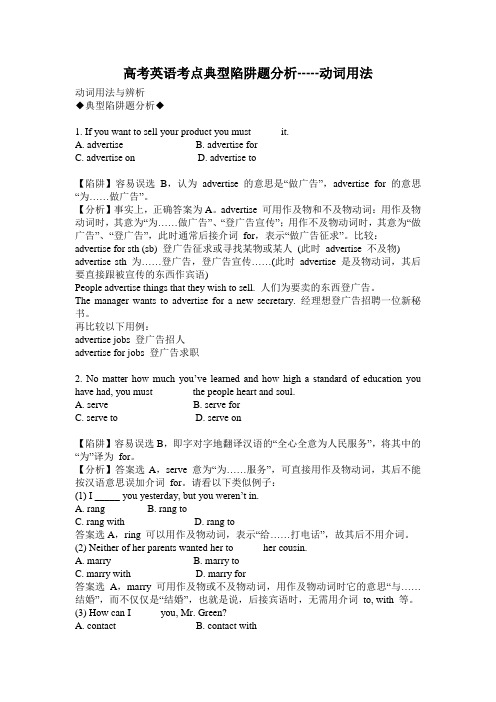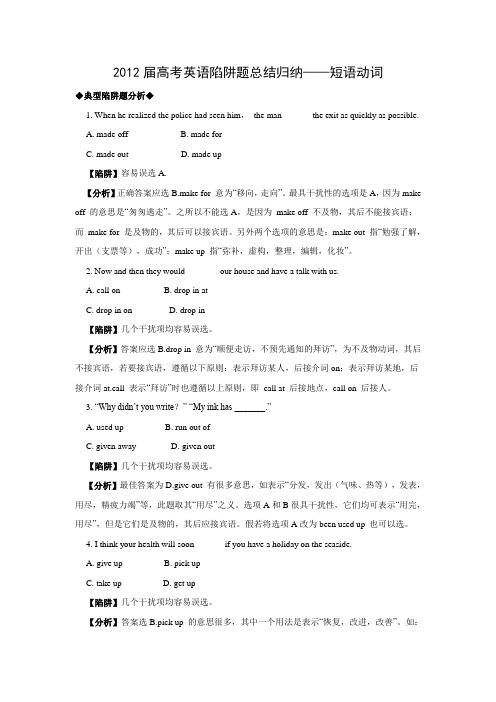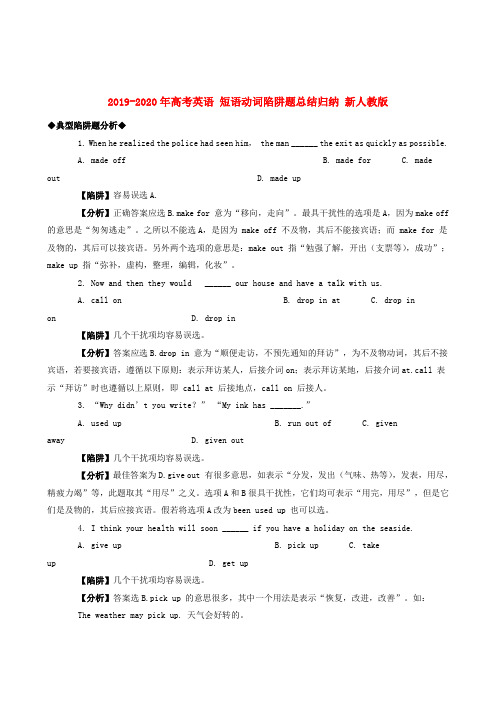高中英语语法易错题:短语动词陷阱题
- 格式:doc
- 大小:77.79 KB
- 文档页数:4

高考英语考点典型陷阱题分析-----动词用法动词用法与辨析◆典型陷阱题分析◆1. If you want to sell your product you must _____ it.A. advertiseB. advertise forC. advertise onD. advertise to【陷阱】容易误选B,认为advertise 的意思是“做广告”,advertise for 的意思“为……做广告”。
【分析】事实上,正确答案为A。
advertise 可用作及物和不及物动词:用作及物动词时,其意为“为……做广告”、“登广告宣传”;用作不及物动词时,其意为“做广告”、“登广告”,此时通常后接介词for,表示“做广告征求”。
比较:advertise for sth (sb) 登广告征求或寻找某物或某人(此时advertise 不及物) advertise sth 为……登广告,登广告宣传……(此时advertise 是及物动词,其后要直接跟被宣传的东西作宾语)People advertise things that they wish to sell. 人们为要卖的东西登广告。
The manager wants to advertise for a new secretary. 经理想登广告招聘一位新秘书。
再比较以下用例:advertise jobs 登广告招人advertise for jobs 登广告求职2. No matter how much you’ve learned and how high a standard of education y ou have had, you must _______ the people heart and soul.A. serveB. serve forC. serve toD. serve on【陷阱】容易误选B,即字对字地翻译汉语的“全心全意为人民服务”,将其中的“为”译为for。

【高考复习】高考英语易错题:动词用法精编陷阱题◆精编陷阱题训练◆1.我们决定不去办公室做其他工作。
a.spareb.besparedc、共享。
掠夺2.heregardsthatbook_____oneoftheworstthathe’s_____read.a、托比,埃弗布。
托比,永远不会c.as,everd.as,never3.“你找到工作了吗?”“不,我……但是没用。
”a.expectedb.triedtoc、管理好了。
计划4.“doyouknowthatjack______apostmanforaboutsixyears?”“yes,isee.”c、哈斯切德。
已经5.thethingthat______isnotwhetheryoufailornot,butwhetheryoutryornot.a、 mattersb。
关心c.considersd.minds6.我不穿绿大衣。
它是一种黑色的颜色。
a.suitb.fitc、 suitsd。
适合7.“willanotherfiftybeenough?”“justtwentywill______.”a、工作B。
做c.suitd.fit8.再见,卡特先生?我的秘书会把你交给他。
a.sendb.leadc、开车。
显示9.thiskindofcancercanbecured,provideditis______early.a、明白了。
获得c.seend.caught10.我们没有为每个人提供任何帮助;你们中的一些人将不得不。
a.helpb.enjoyc、共享。
不用的11.heaskedhertomarryhimandshe_____him.a、回答B。
收到c.acceptedd.agreed12.我最担心的是当我知道这些问题是什么时。
a.doneb.seenc、完成。
实现13.theplanlooksgoodonpaper,butwillit_____?a、工作B。

2012届高考英语陷阱题总结归纳——短语动词◆典型陷阱题分析◆1. When he realized the police had seen him,the man ______ the exit as quickly as possible.A. made offB. made forC. made outD. made up【陷阱】容易误选A.【分析】正确答案应选B.make for 意为“移向,走向”。
最具干扰性的选项是A,因为make off 的意思是“匆匆逃走”。
之所以不能选A,是因为make off 不及物,其后不能接宾语;而make for 是及物的,其后可以接宾语。
另外两个选项的意思是:make out 指“勉强了解,开出(支票等),成功”;make up 指“弥补,虚构,整理,编辑,化妆”。
2. Now and then they would ______ our house and have a talk with us.A. call onB. drop in atC. drop in onD. drop in【陷阱】几个干扰项均容易误选。
【分析】答案应选B.drop in 意为“顺便走访,不预先通知的拜访”,为不及物动词,其后不接宾语,若要接宾语,遵循以下原则:表示拜访某人,后接介词on;表示拜访某地,后接介词at.call 表示“拜访”时也遵循以上原则,即call at 后接地点,call on 后接人。
3. “Why didn’t you write?” “My ink has _______.”A. used upB. run out ofC. given awayD. given out【陷阱】几个干扰项均容易误选。
【分析】最佳答案为D.give out 有很多意思,如表示“分发,发出(气味、热等),发表,用尽,精疲力竭”等,此题取其“用尽”之义。
选项A和B很具干扰性,它们均可表示“用完,用尽”,但是它们是及物的,其后应接宾语。

易错点08 非谓语动词目录01 易错陷阱(5大陷阱)02 举一反三【易错点提醒一】非谓语动词作状语易混易错点【易错点提醒二】非谓语动词作定语易混易错点【易错点提醒三】非谓语动词作宾语补足语易混易错点【易错点提醒四】非谓语动词作宾语易混易错点【易错点提醒五】非谓语动词作表语和主语易混易错点易混易错点03 易错题通关易错陷阱1:非谓语动词作状语易混易错点。
【分析】非谓语动词作状语,其逻辑主语是句子的主语。
易错陷阱2:非谓语动词作定语易混易错点。
易错陷阱4:非谓语动词作宾语易混易错点。
易错陷阱5:非谓语动词作表语和主语易混易错点。
【易错点提醒一】非谓语动词作状语易混易错点【例1】(广东省2023-2024学年6校高三联考)The tablet, (find) in Jindong Village, measures 1.4 meters high, 0.61 meters wide, and 0.14 meters thick.【答案】found【解析】考查非谓语动词。
句意:这块石碑出土于金洞村,高1.4米,宽0.61米,厚0.14米。
本句的谓语动词是measures,所以该空在这里作定语,修饰The tablet,且与逻辑主语为被动关系,故填动词的-ed形式。
故填found。
【变式1】(广东省六校2023-2024学年高三第一次联考试题)Dr. Wang began to question the umbrella species narrative and carried out research, only (find) that panda conservation had not helped large carnivores in China.【变式2】(广东省广东省四校联考2023-2024学年高三9月试题)The study, which appeared in the journal PLOS Medicine,indicates that individuals who take in higher-than-average amounts of【变式3】(2023年广东高三模拟)_______ (dress) in a full body suit of ice, a symbol of purity and【解析】考查非谓语动词。

2019-2020年高考英语短语动词陷阱题总结归纳新人教版◆典型陷阱题分析◆1. When he realized the police had seen him, the man ______ the exit as quickly as possible.A. made offB. made forC. madeout D. made up【陷阱】容易误选A.【分析】正确答案应选B.make for 意为“移向,走向”。
最具干扰性的选项是A,因为make off 的意思是“匆匆逃走”。
之所以不能选A,是因为 make off 不及物,其后不能接宾语;而 make for 是及物的,其后可以接宾语。
另外两个选项的意思是:make out 指“勉强了解,开出(支票等),成功”;make up 指“弥补,虚构,整理,编辑,化妆”。
2. Now and then they would ______ our house and have a talk with us.A. call onB. drop in atC. drop inon D. drop in【陷阱】几个干扰项均容易误选。
【分析】答案应选B.drop in 意为“顺便走访,不预先通知的拜访”,为不及物动词,其后不接宾语,若要接宾语,遵循以下原则:表示拜访某人,后接介词on;表示拜访某地,后接介词at.call 表示“拜访”时也遵循以上原则,即 call at 后接地点,call on 后接人。
3. “Why didn’t you write?” “My ink has _______.”A. used upB. run out ofC. givenaway D. given out【陷阱】几个干扰项均容易误选。
【分析】最佳答案为D.give out 有很多意思,如表示“分发,发出(气味、热等),发表,用尽,精疲力竭”等,此题取其“用尽”之义。

易错点08非谓语动词易错陷阱1:非谓语动词作状语易混易错点。
【分析】非谓语动词作状语,其逻辑主语是句子的主语。
现在分词:doing表示主动关系,表伴随、自然而然的结果、原因、条件等;having done强调动作发生在主句谓语之前。
having done强调被动且完成的动作。
过去分词:表被动,表时间、原因、条件等。
不定式:作目的状语,用于句中时不能用逗号。
不定式作结果状语,表示出乎意料的结果。
作原因、程度等状语。
用于固定短语中。
易错陷阱2:非谓语动词作定语易混易错点。
现在分词:表示主动或正在进行的动作。
being done表示被动且正进行的动作,作后置定语。
过去分词:表被动,易与谓语动词被动被动语态be done和谓语动词主动语态的过去时混淆。
不定式:需跟不定式的名词:ability,attempt,decision,effort,failure,way,promise等。
易错陷阱3:现在分词与过去分词作补语易混易错点。
现在分词:作宾补时,表示主动或正进行。
过去分词:在表示感觉或心理状态的动词后作宾补。
如:see,watch,observe,look at,hear,li sten to,notice,feel等;在“使”动词后作宾补。
如:have,get,keep,leave,make等。
不定式:常跟不定式作宾补的动词:allow,ask,beg,cause,command,elect,forbid,force,get,help, intend,invite,would like,order,permit,persuade,prefer,request,teach,advise,wish,encourage, instruct,urge等.易错陷阱4:非谓语动词作宾语易混易错点。
常跟动名词作宾语的动词或短语:finish,practice,enjoy,mind,avoid,admit,appreciate,feel like,suggest,stand,risk,consider,escape,miss,delay,dislike,imagine,understand,look forward to,insist on,be busy,can't help,get down to,be worth等。
高考英语高中英语语法易错题:动词语法陷阱题1. We’re so busy that no one in t he office can_____ for any other work.A. spareB. be sparedC. shareD. be shared2. He regards that book _____ one of the worst that he’s _____ read.A. to be, everB.to be, neverC. as, everD. as, never3. “Did you get a job?” “No, I ______, but it’s no use.”A. expectedB. tried toC. managed toD. planned4. “Do you know that Jack ______ a postman for about six years?” “Yes, I see.”A. has becomeB. has turnedC. has changedD. has been5. The thing that ______ is not whether you fail or not, but whether you try or not.A. mattersB. caresC. considersD. minds6. I don’t want the green coat. It is red and black colours that ______ me very well.A. suitB. fitC. suitsD. fits7. “Will another fifty be enough?” “Just twenty will ______.”A. workB. doC. suitD. fit8. Goodbye, Mr Carter — my secretary will _____ you to the door.A. sendB. leadC. driveD. show9. This kind of cancer can be cured, provided it is ______ early.A. gotB. gainedC. seenD. caught10. We haven’t enough books for everyone; some of you will have to _____.A. helpB. enjoyC. shareD. spare11. He asked her to marry him and she _____ him.A. answeredB. r eceivedC. acceptedD. agreed12. My worst fears were _____ when I saw what the exam questions were.A. doneB. seenC. finishedD. realized13. The plan looks good on paper, but will it _____?A. workB. passC. agreeD. does14. What’s the matter with the radio? Why isn’t it _____?A. broadcastingB. workingC. doingD. sounding15. High unemployment _____ the government billions of pounds in lost taxes.A. spendsB. takesC. usesD. costs16. It’s hard to rescue drowning people because they _____ so much.A. sinkB. swimC. jumpD. struggle17. She went to the station to meet her husband, but _____ him in the crowd.A. passedB. recognizedC. missedD. lost18. I m issed what was happening because I wasn’t ______ ver y closely.A. noticingB. runningC. watchingD. glancing19. If you lend me a pound, it will _____ me having to go to the bank.A. saveB. shareC. serveD. help20. Don’t _______ your breath trying to persuade them; they’ll never listen.A. useB. wasteC. spendD. put21. He has spent little time on his lessons this term, so h e _____ to fail the exam.A. expectsB. hopesC. wishesD. requir es22. He will never ______ anything if he doesn’t work hard.A. hopeB. wishC. achieveD. succeed答案与解析1. 选B,spare 在表示“腾出或省去(多余的人或物)”。
易错点07 动词的时态和语态目录01 易错陷阱(4大陷阱)02 举一反三【易错点提醒一】一般现在时、一般过去时和现在完成时易混易错点【易错点提醒二】一般过去时和过去完成时易混易错点【易错点提醒三】现在完成时和过去完成时易混易错点【易错点提醒四】主动语态与被动语态易混易错点03 易错题通关易错陷阱1:一般现在时、一般过去时和现在完成时易混易错点。
【分析】【高考链接】(2023年浙江卷1月)The large siheyuan of these highranking officials and wealthy businessmen often________ (feature)beautifully carved and painted roof beams and pillars(柱子).【答案】featured【解析】考查动词时态。
句意:这些高级官员和有钱商人的高大的四合院,通常以雕刻精美和被粉刷的房顶横梁和柱子为特点。
分析句子结构可知,空格处需要填谓语动词,再结合and后动词时态可知,空格处应用一般过去时。
故填featured。
易错陷阱2:一般过去时和过去完成时易混易错点。
【分析】1.下列动词hope、wish、expect、think、intend、mean、suppose等,用过去完成时表示“原本……(事实上未能……)”。
2.This/It/That was the first/second/third ... time that ...表示“这/那是(某人)第几次做某事”,that从句中要用过去完成时。
3.hardly ... when ...和no sooner ... than ...两个句型中,主句均用过去完成时。
易错陷阱3:现在完成时和过去完成时易混易错点。
【分析】易错陷阱4:主动语态和被动语态易混易错点。
【分析】➢受母语干扰,翻译上下文时混淆被动语态与主动语态。
➢混淆谓语动词被动语态构词be+done与非谓语动词重点过去分词done。
------精品文档!值得拥有!------短语动词考点◆典型陷阱题分析◆1. When he realized the police had seen him, the man ______ the exit as quickly as possible.A. made offB. made forD. made upC. made outA。
【陷阱】容易误选,因为。
最具干扰性的选项是A意为“移向,走向”正确答案应选【分析】B。
make for不及物,其后不能接宾make off 。
之所以不能选”A,是因为make off 的意思是“匆匆逃走勉强“make for 是及物的,其后可以接宾语。
另外两个选项的意思是:make out 指语;而。
“弥补,虚构,整理,编辑,化妆”支票等(),成功”;make up 指了解,开出Now and then they would ______ our house and have a talk with us. 2.B. drop in at A. call onD. drop in C. drop in on几个干扰项均容易误选。
【陷阱】,为不及物动词,”B。
drop in 意为“顺便走访,不预先通知的拜访【分析】答案应选;表示拜访某地,on其后不接宾语,若要接宾语,遵循以下原则:表示拜访某人,后接介词call at 后接地点,call on 后接人。
时也遵循以上原则,即后接介词at。
call 表示“拜访”3.“Why didn't you write?”“My ink has _______.”B. run out of A. used upD. given out C. given away几个干扰项均容易误选。
【陷阱】发表,,热等(气味、)分发,give out 【分析】最佳答案为D。
有很多意思,如表示“发出用完,“和用尽用尽,精疲力竭”等,此题取其“”之义。
【高考复习】高考英语易错考点动词用法常见陷阱分析动词用法与辨析◆ 典型陷阱问题分析1.ifyouwanttosellyourproductyoumust_____it.a、广告B。
广告c.advertiseond.advertiseto很容易错误地选择B。
我认为广告的意思是“广告”,而广告的意思是“广告的”。
【分析】事实上,正确答案为a。
advertise可用作及物和不及物动词:用作及物动词时,其意为“为……做广告”、“登广告宣传”;用作不及物动词时,其意为“做广告”、“登广告”,此时通常后接介词for,表示“做广告征求”。
比较:为某事或某人登广告advertisesth为……登广告,登广告宣传……(此时advertise是及物动词,其后要直接跟被宣传的东西作宾语)人们总是认为他们要销售。
人们为他们想卖的东西做广告。
themanagerwantstoadvertiseforanewsecretary.经理想登广告招聘一位新秘书。
然后比较以下用例:advertisejobs登广告招人招聘2.nomatterhowmuchyou’velearnedandhowhighastandardofeducationyouhavehad,youmus t_______thepeopleheartandsoul.a、 serveb。
服务c.servetod.serveon【陷阱】很容易错误地选择B,即逐字翻译“全心全意为人民服务”,将“为”翻译成“为”。
【分析】答案选a,serve意为“为……服务”,可直接用作及物动词,其后不能按汉语意思误加介词for。
请看以下类似例子:(1)我昨天和你在一起,但你不在。
a.rangb.rangtoc、朗格威德。
朗托答案选a,ring可以用作及物动词,表示“给……打电话”,故其后不用介词。
(2)她的父母都不想让她成为她的表亲。
a.marryb.marrytoc、结婚了。
结婚答案选a,marry可用作及物或不及物动词,用作及物动词时它的意思“与……结婚”,而不仅仅是“结婚”,也就是说,后接宾语时,无需用介词to,with等。
高中英语语法易错题:短语动词陷阱题1. To our surprise the stranger _____ to be an old friend of my mother’s.A. turned outB. turned upC. set outD. set up2. All the girls swam in the lake except two, who _____ halfway.A. gave offB. gave upC. gave awayD. gave out3. If the new arrangement doesn’t _____, we’ll go back to the old one.A. work overB. work outC. work upD. work i n4. “Have great changes taken place in your village?” “Yes, A new sc hool was ______ in the village last year.”A. held upB. s et upC. sent upD. brought up5. I had to ______ because someone else wanted to use the phone.A. give upB. put upC. hang upD. ring up6. Elephants would ______ if men were allowed to shoot as many as they wished.A. die downB. die outC. die awayD. die off7. My study of biology has ___C___ much of my spare time, but it has given me a great deal of enjoyment.A. taken offB. taken downC. taken upD. taken away8. The p lan ___ just because people were unwilling to co-operate(合作).A. broke downB. pulled downC. turned downD. put down9. The government has _______ the parents to work with teachers in the education of their children.A. asked forB. called forC. looked forD. paid for10. John has put on so much weight recently that his mother has to ______ all his trousers to his measure.A. let outB. give awayC. bring inD. make up11. I can ______ some noise while I’m studying, but I can’t stand very loud noise.A. put up withB. get rid ofC. have effect onD. keep away from12. The mother often tells her son to be a good boy, warning him to ______ trouble.A. hold back fromB. keep out ofC. break away fromD. get rid of13. To my surprise, the manager ______ 30 dollars from my salary without any good reason.A. cut offB. held upC. brought downD. kept back14. Steven has a lot of work to _______ in the office since he has been away for quite a few days.A. take upB. make upC. work outD. carry out15. Although Jane agrees with me on most points, there was one on which she was unwilling to _______.A. give outB. give inC. give awayD. give off16. You should ______ what your parents expect of you.A. live up toB. stand up toC. look up toD. run up to17. I can hardly believe my eyes. What a poor composition you have _______. There are so many wrong spellings in it.A. turned intoB. turned offC. turned toD. turned in18. “Why don’t we go for a picnic this weekend?” “Good idea! I would ______ the car an d you’ll prepa re the food.”A. look afterB. take care ofC. see about D get down to19. How I wish that I could ______ my ideas in simple and wonderful English when chatting on the net.A. set outB. set offC. set overD. set up20. Some kinds of animals can _______ the colour of their surroundings.A. take onB. dress upC. put onD.get into答案与解析1. 选A。
turn out 意为“结果是,原来是”等;turn up 意为“找到,发现,出现,开大音量”等;set out 意为“开始,出发,陈述”等;set up 意为“设立,竖立,架起,升起,创(纪录),提出”等。
2. 选B。
give up 意为“放弃”;give out 意为“分发,发出(气味、热等),发表,用尽,精疲力竭”;give away意为“送掉,分发,放弃,泄露,出卖”;give off 意为“发出(蒸汽、光等),长出(枝、杈等)”。
3. 选B。
work out 在此表示“有预期结果”;work over 意为“调查,重做”;work up 意为“逐步建立,逐步发展”;work in 意为“配合,引进”。
4. 选B。
set up 意为“建立”;hold up 意为“举起,支撑,继续下去,阻挡,拦截”;send up 意为“发出,射出,长出,使上升”;bring up 意为“教育,培养,提出”。
5. 选C。
give up 指“放弃”,put up 指“举起,架起,修建,张贴”等,hang up 指“挂断(电话)”,ring up 指“给某人打电话”。
6. 选B。
die away 指“(声音、风、光线等)渐息,渐弱”;die down 指“(慢慢)熄灭,平静下来”;die off 指“一个一个地死去”;di e out 指“(家族、种族、习俗、观念等)灭绝,绝迹”。
7. 选C。
take up 意为“开始(学习或从事等),继续,占去,接纳,提出”;take off意为“脱下,起飞,打折,请假”;take away 意为“取走”;take down 意为“写下,拆下”。
8. 选A。
break down意为“中止,毁掉,压倒,停顿,倒塌”;pull down 意为“摧毁,推翻,使降低,使身体变差”;turn down 意为“拒绝,关小音量,减弱,降低”;put down 意为“放下,拒绝,镇压,削减,记下”。
9. 选B。
call for 意为“要求,提倡”;ask for 意为“请求,索要”;look for 意为“寻找”;pay for 意为“为……付钱”。
10. 选A。
let out 意为“放掉,泄露,放大,出租”;give away 意为“送掉,分发,放弃,泄露, 出卖,让步”;bring in 意为“生产,挣得,介绍引进”;make up 意为“弥补,虚构,缝制,整理,和解,编辑,化妆”。
11. 选A。
put up with 意为“忍受,容忍”;get rid of 意为“摆脱,消除,去掉”;have effect on 意为“对……有影响”;keep away from意为“远离,不接近”。
12. 选B。
hold back from 意为“向……隐瞒”;keep out of 意为“使在……之外”;break away from 意为“脱离”;get rid of 意为“摆脱,消除,去掉”。
13. 选D。
keep back 意为“扣下,留下,阻挡,隐瞒”;hol d up意为“举起,支撑”;bring down 意为“打倒,击落,打死,降低”;cut off 意为“切断,断绝”。
14. 选B。
make up 意为“弥补,虚构,整理,编辑,化妆”;take up 意为“拿起,开始从事,继续,吸收”;work out 意为“计算出,设计出,有预期结果”;carry out 意为“完成,实现,贯彻,执行”。